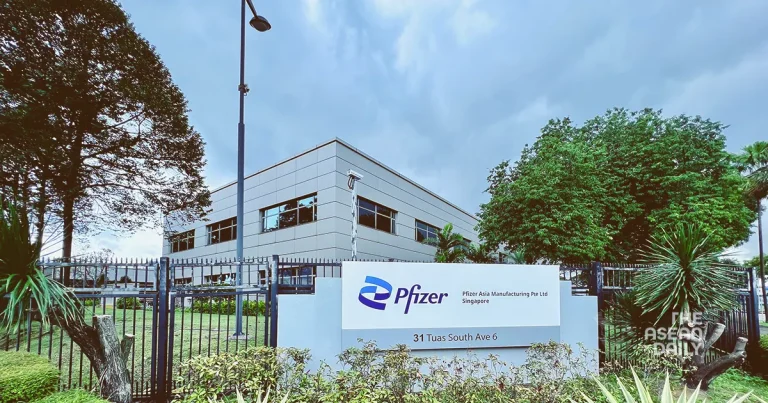5-8-2024 (SINGAPORE) While Singapore may not be considered a low-cost manufacturing base, the city-state’s world-class infrastructure, robust intellectual property protection, access to a skilled workforce, and a government with a forward-thinking vision have solidified its position as the go-to destination for global pharmaceutical giant Pfizer. In a resounding endorsement of Singapore’s business-friendly environment, the American multinational has unveiled a new $1 billion plant, one of its most advanced manufacturing facilities worldwide.
“There are no short-term investments in the world of pharmaceuticals,” said Mr. Mike McDermott, Pfizer’s Chief Global Supply Officer and Executive Vice President, in an exclusive interview with The Straits Times. “Investments take a long time to come to fruition, and then we expect to be operating that for decades. It is not an in-and-out type scenario.”
McDermott’s remarks underscore Pfizer’s long-term commitment to Singapore, a partnership forged on shared values of stability, innovation, and strategic foresight. “So, we need governments, we need partners that are in it for the long run along with us… and Singapore fits within that perfectly,” he added.
The state-of-the-art facility, an extension of an existing 20-year-old site, represents Pfizer’s first large-scale investment in active pharmaceutical ingredient (API) manufacturing globally in many years. APIs are the biologically active components of drugs, and the plant will produce these critical substances for Pfizer’s cancer, pain, and antibiotic medicines. The APIs produced in Singapore will then be exported to Pfizer’s global network of plants for the final formulation of injectable drugs and oral pills.
Remarkably, the construction of the plant commenced in 2020, amidst the unprecedented challenges posed by the COVID-19 pandemic. McDermott commended Singapore’s efficient and disciplined workforce for achieving this remarkable feat, despite various pandemic-related disruptions. “I would count the Singapore Government and the Singapore citizens as brilliant in the ability to achieve this construction on time, on budget during a global pandemic,” he said.
The plant’s inauguration comes on the heels of Pfizer’s extraordinary accomplishment during the pandemic – the development of a viable COVID-19 vaccine in just 10 months, a process that typically takes a decade or more. Moreover, the company produced an astonishing three billion doses of the vaccine in a single year, compared to its pre-pandemic annual production of 200 million doses.
“There were many challenges not just with scientifically coming up with the vaccine, but then how do you get it to patients in time and in a period when several countries were shutting down their borders,” McDermott reflected. Pfizer navigated these challenges by collaborating closely with government officials, health authorities, and other institutions, while leveraging sophisticated supply chains to reroute shipments swiftly in response to lockdowns and border closures.
While the pandemic highlighted the importance of unhindered global trade and access to technology, McDermott acknowledged that supply chains and technological flows remain vulnerable to various issues, including geopolitical tensions. “Do I think the world is prepared for every outcome? No,” he admitted.
However, McDermott emphasized that industries, particularly pharmaceuticals, are better prepared than ever before, with companies like Pfizer continually working on strategies to enhance agility and preparedness. Countries that prioritize unencumbered supply chains and foster technological innovation, he noted, will continue to attract more investments than others – and Singapore stands out as a prime example.
Despite the city-state’s reputation as an expensive location compared to many other Asian countries, McDermott highlighted Singapore’s competitive advantages in factors that Pfizer deems crucial. “We need good infrastructure. I mean, we cannot operate in a country from where we cannot move goods freely around. We need a country that respects our intellectual property,” he explained.
Moreover, Singapore’s talent pool sets it apart, offering companies like Pfizer access to a skilled and talented workforce – a critical resource in a knowledge-intensive industry like pharmaceuticals. “Do I have enormous confidence in our investments here for the long term? Absolutely,” McDermott affirmed.




